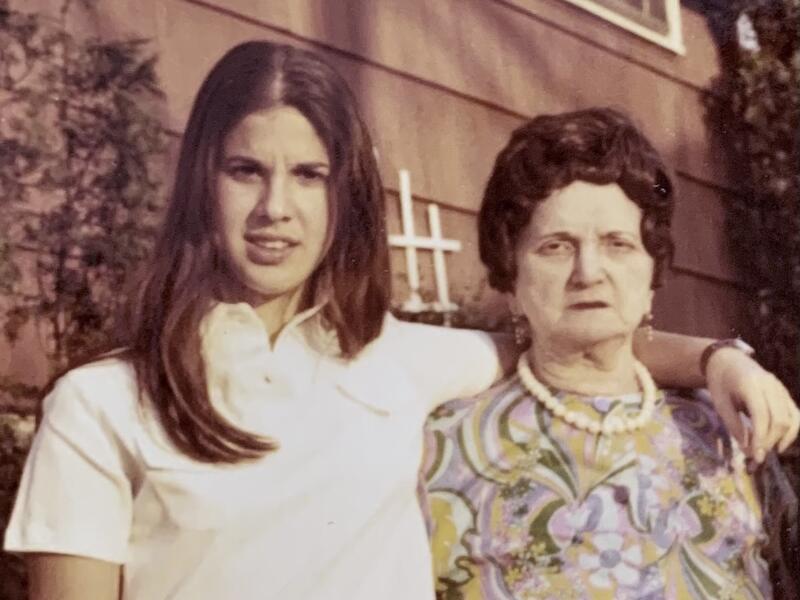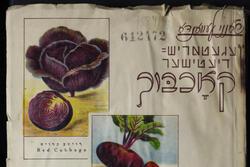"Put a Lid on It": My Grandma’s Feminist Formula
The other day, I saw some pricey kitchen cookware on sale, marked down for lack of lids, and I thought of the word pokreshke, my Eastern European grandmother’s Yiddish word for a pot lid. But while a literal pot made me think of the word, I don’t only associate it with Jewish cooking or holiday recipes; rather, it has a metaphorical significance. When my grandmother used the Yiddish word for pot lid, she was talking about her formula for being a strong and smart Jewish wife and woman—being the pokreshke.
Even now, I can still recall an image of my grandmother in our kitchen, her blue apron pinned tightly to her dress, sharing Shtisel-like life wisdom with me. She’d probably just finished koshering the chickens with salt and kneading the dough for her babka. “Jewish wives and mothers are the lids over the boiling soup,” she explained to me. “We are the ones who keep all of life’s troubles from boiling over. It’s our job to turn down the heat, find the right lid that fits and make sure everything goes smoothly.” I was a child of the 60s and 70s, and this didn’t sound remotely feminist or relatable in my new world where women were becoming doctors, lawyers, and journalists in larger numbers. Advice emanating from a grandmother’s kitchen couldn’t possibly serve them or me.
I dismissed it outright as another one of my grandmother’s outmoded, Old World stories. One of her favorite retellings was about a woman who bought a new hat that her husband hated and demanded she return. Instead of arguing, the wife put the hat away and showed it to him weeks later when he was in a “better mood” and, therefore, approved of the purchase. This story is intended to demonstrate how a smart Jewish wife “handles” her husband.
But unlike the hat story, my grandmother’s advice about being the pokreshke has stuck with me and guided me. Over the years, my grandmother’s words didn’t seem outdated, but rather useful in ways I couldn’t possibly imagine then as a teenager in her kitchen. Women may not be mere crude lids, but it became clear to me that we are often the mediators and the smoother-overs in many situations. I’ve certainly played that role. “Let’s look at this calmly,” I’ve heard myself say. “Let’s take everyone’s opinions, feelings, and motivations into account,” I’ll repeat, as cool as I can manage. I’ve mediated family squabbles while separating siblings warring with one another in the back seat of the car. During my career as a lawyer, I sometimes worked with unreasonable clients and colleagues and had to maintain control. Later, as a judge in the courtroom, I formulated compromises, settlements, and plea deals when emotions were high. It was a role I mostly enjoyed.
“Conflict resolution” and “dispute settlement” weren’t terms my grandmother was familiar with, but even a Yiddishe grandmother knows and understands human nature and the ways and means to get people to stop, listen, and behave. How different are those terms from my grandmother’s pokreshke advice to symbolically lower the flame and put a lid on it? And how is the advice dissimilar from the words of my feminist hero, Ruth Bader Ginsburg, when she said “I’m a very strong believer in listening and learning from others?”
Variants of the gender-neutral idiom, “Put a lid on it,” exist in English, French, Spanish, Mandarin Chinese, and many other languages. The global saying, meaning “keeping something under control,” isn’t unique to my grandmother or even to Yiddish. But her version of the phrase, and counsel to me, emphasized the woman’s role—not only to “put” a lid on something, but to “be” the lid. Did my grandmother’s words somehow insinuate themselves into my nascent psyche, or was it my own innate capacity and talent as a woman to soften the hard edges, smooth out the wrinkles? It’s probably a combination of all of the above.
In my grandmother’s time, there were fewer cookware items to transform into metaphors around women’s roles in the home and in life. Today there are many more choices—nonstick, enamel, ceramic cast iron, steel, copper—so many ways and means to cook. Each could be their own little metaphor for handling life’s ups and downs. I’m sure my grandmother would have found a good one for nonstick Teflon—something like “don’t let the problems of the world attach themselves to you.” I wish she were around to share the life lesson she’d glean from the “Instapot.”
Though I was initially skeptical, I now look back on my grandmother’s pokreshke lesson with affection and respect. It sounds sweet to my English-speaking ear, and has come to be an unexpected theme in my life.
And that great sale on kitchen cookware on sale, sans lids? I couldn’t do it. I had to walk away. I couldn’t buy a pot without a pokreshke.








I love it coming from a Tunisian Jewish family we’re generally women were strong and the wife had the main role.
A wonderfully insightful and sentimental story by Leora Krygier